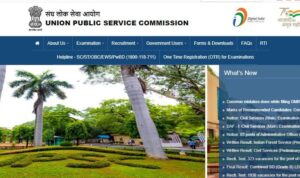Table of Contents
The Union Public Service Commission (UPSC) conducts the Civil Services Examination (CSE) annually to recruit candidates for prestigious services such as the Indian Administrative Service (IAS), Indian Foreign Service (IFS), and Indian Police Service (IPS). One of the crucial subjects in the UPSC Mains is GS Paper 4, which focuses on Ethics, Integrity, and Aptitude.
In this article, we will cover the detailed syllabus, important topics, booklist, preparation strategies, and case studies to help aspirants ace the UPSC Mains GS 4 effectively.
UPSC Mains GS 4: Ethics, Integrity, and Aptitude
UPSC Mains GS Paper 4 (Ethics, Integrity, and Aptitude) tests candidates’ ethical and moral values in governance and public administration. It covers topics like ethics and human interface, attitude, emotional intelligence, and probity in governance. The paper includes direct concept-based questions and case studies, requiring analytical and ethical reasoning. Ethics Paper 4 is crucial for assessing a candidate’s integrity and decision-making skills.
| General Studies Paper 4 Overview | |
|---|---|
| Paper Name | General Studies Paper 4 (GS-4) |
| Total Marks | 250 |
| Duration | 3 Hours |
| Sections | 2 Sections – Theory-based Questions & Case Studies |
| Number of Questions | 12 |
| Types of Questions | Conceptual & Applied (Case Studies) |
| Marks Distribution | 10-mark & 20-mark questions |
| Word Limit | 10-mark questions: 150 words 20-mark questions: 250 words |
| Nature of Paper | Subjective & Analytical |
| Focus Areas | Ethics, Integrity, Aptitude, Governance, Emotional Intelligence, Civil Service Values |
UPSC Mains GS 4 Syllabus
The Ethics, Integrity, and Aptitude syllabus is designed to test candidates’ ethical competence, attitude, and decision-making abilities. Below is a detailed breakdown:
1. Ethics and Human Interface
- The Essence of Ethics
- Determinants and Consequences of Ethics in Human Interaction
- Dimensions of Ethics
- Ethics in Public and Private Relationships
- Human Values – Lessons from the Lives and Teachings of Great Leaders, Reformers, and Administrators
- Role of Society, Family, and Educational Institutions in Inculcating Ethical and Moral Values
2. Attitude
- Content, Structure, and Function of Attitude
- Influence of Attitude on Thought and Behaviour
- Relation of Attitude to Thought and Behaviour
- Political and Moral Attitudes
- Social Influence and Persuasion
3. Aptitude
- Aptitude and Foundational Values of Civil Service
- Integrity, Impartiality, and Non-Partisanship
- Objectivity
- Dedication to Public Service
- Empathy, Compassion, and Tolerance Towards the Weaker Sections
4. Emotional Intelligence
- Concepts of Emotional Intelligence
- Utility and Application of Emotional Intelligence in Governance and Administration
5. Contributions of Thinkers and Philosophers
- Contributions of Indian and World Philosophers to Morality and Ethics
6. Public/Civil Service Values and Ethics in Public Administration
- Status and Associated Problems
- Ethical Concerns and Dilemmas in Government and Private Institutions
- Laws, Rules, Regulations, and Conscience as Sources of Ethical Guidance
- Accountability and Ethical Governance
- Strengthening of Ethical and Moral Values in Governance
- Ethical Issues in International Relations and Funding
- Corporate Governance
7. Probity in Governance
- Challenges of Corruption
- Citizen’s Charters
- Codes of Conduct and Ethics
- Concept of Public Service
- Information Sharing and Transparency in Government
- Right to Information (RTI)
- Philosophical Basis of Governance and Probity
- Utilization of Public Funds
- Work Culture
Important Topics from UPSC Mains GS 4 Syllabus
Some crucial topics include:
- Emotional Intelligence and Its Importance
- Role of Family and Society in Value Education
- Code of Ethics vs. Code of Conduct
- Ethical Dilemmas in Public and Private Institutions
- Ethics in International Relations
- Ethics in Public Service and Corporate Governance
- Tolerance and Compassion for the Weaker Section
- Normative Ethics with Examples
- Steps to Control Corruption
- Importance of Vigilant Citizens
- Contribution of Philosophers to Ethics
Structure of UPSC Mains GS 4
The structure of GS Paper 4 is as follows:
- The paper is divided into two sections containing 12 questions.
- Answering all questions is compulsory.
- The questions are divided into:
- Theoretical Questions (Concept-based)
- Case Studies (Applied Ethics)
- Total Marks: 250
- Word Limit:
- 10-mark questions – 150 words
- 20-mark questions – 250 words
- The pattern and difficulty level of questions change every year.
How to Prepare for UPSC Mains GS 4?
1. Understand the Syllabus Thoroughly
- Read the syllabus multiple times and understand each component.
- Identify frequently asked topics and focus more on them.
2. Use Standard Books
- Refer to NCERT books for the basics.
- Study case studies from real-life administrative experiences.
3. Develop Ethical and Logical Thinking
- Read about famous ethical dilemmas and how they were resolved.
- Develop a logical and rational approach to ethical questions.
4. Practice Case Studies
- Solve previous year’s case studies and analyze their solutions.
- Practice structuring your answers effectively.
5. Revise and Make Notes
- Create concise notes for revision.
- Regularly revise ethical concepts and definitions.
Best Books for UPSC Mains GS 4 Syllabus
| Book | Author/Publication |
|---|---|
| Ethics, Integrity & Aptitude | G Subba Rao & P N Roy Chowdhury |
| Lexicon for Ethics | Niraj Kumar |
| Ethics, Integrity, and Aptitude | Santosh Ajmera & Nanda Kishore Reddy |
| Ethics, Integrity, and Aptitude | StudyIQ Notes |
| Ethics in Governance | Ramesh K Arora |
| ARC Reports | – |
Case Studies from UPSC Mains GS 4 Syllabus
Case studies in GS Paper 4 assess the application of ethical principles to real-life situations. Some important themes include:
- Conflict of Interest
- Corruption and Governance Issues
- Gender Sensitivity and Social Justice
- Environmental Ethics
- Moral Dilemmas in Policy Making
Candidates must provide practical, ethical, and legally sound solutions when solving case studies.
Conclusion
The UPSC GS 4 Ethics paper plays a crucial role in selecting candidates with high moral and ethical standards. With proper strategy, revision, and practice, aspirants can secure good marks in this paper. Understanding real-life scenarios, solving case studies, and keeping ethical values at the core of answers will help in scoring well in UPSC Mains GS 4.
Start your preparation with a structured approach, refer to standard books, and practice answer writing regularly to excel in the UPSC GS 4 (Ethics, Integrity, and Aptitude) paper.


 How Much Do You Need to Score to Top the...
How Much Do You Need to Score to Top the...
 UPSC Topper Marksheet 2024: Subject-Wise...
UPSC Topper Marksheet 2024: Subject-Wise...
 UPSC Cadre Allocation Policy 2025 for IA...
UPSC Cadre Allocation Policy 2025 for IA...





















